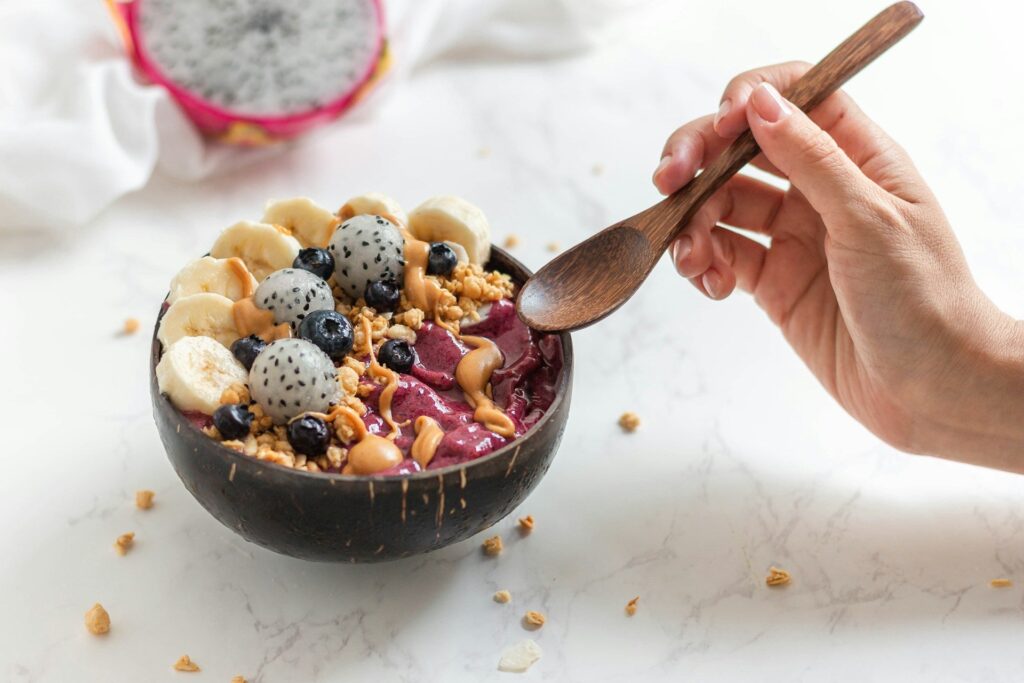
Such a low-grade inflammation might not produce many signs. It may cause fatigue, sleep issues, and some other health issues in its early stages. However, ultimately, chronic inflammation leads to life-threatening and debilitating conditions. Such low-grade inflammation is challenging to manage with medications, and it is best managed through lifestyle changes like stress management, exercise, and dietary changes. One such way of reducing chronic inflammation is starting your day with an anti-inflammatory breakfast.
Starting the day with an anti-inflammatory breakfast is one of the best ways to fuel your body with nutrients that support overall health. The foods you eat in the morning set the tone for the rest of the day, influencing energy levels, metabolism, and even mood. A diet rich in whole foods and superfoods for inflammation can help combat these issues and promote better well-being.
Why Your Breakfast Matters
Inflammation is the body’s natural response to stress, infection, or injury, but when it becomes chronic, it can lead to long-term health complications. Gut health and inflammation are closely linked, meaning that consuming anti-inflammatory foods can support digestion and immune function. Eating the best foods for inflammation in the morning ensures that your body starts the day with the nutrients needed to regulate inflammatory responses and improve gut balance.
Discover the best anti-inflammatory breakfast foods that reduce inflammation, increase energy, and promote overall health, ensuring you start every day feeling vibrant, focused, and ready to tackle your goals.
Introduction: The Power of Anti-Inflammatory Breakfasts
We’ve all heard that breakfast is the most important meal of the day, but what you choose to eat in the morning can significantly impact not only your energy levels but also your long-term health. While a typical breakfast may consist of sugary cereals or processed foods, shifting to an anti-inflammatory breakfast can provide you with the right nutrients to reduce inflammation, increase energy, and enhance overall well-being.
Inflammation is a natural response of the body to injury or infection, but chronic inflammation—often triggered by poor diet, stress, and environmental factors—has been linked to numerous health conditions, including heart disease, diabetes, arthritis, and even mental health disorders like depression. The good news is that a well-rounded, anti-inflammatory diet can help combat this problem.
Starting your day with an anti-inflammatory breakfast can set the tone for a healthier lifestyle. This article will explore the benefits of an anti-inflammatory breakfast, list the best foods to include, and share delicious, easy-to-make recipes that will keep you energized all day long.
What Is Inflammation and Why Should You Care?
Understanding Inflammation: The Basics
Inflammation is the body’s natural defense mechanism. It’s part of the immune system’s response to injury or infection, where white blood cells release chemicals to protect tissues from harm. Acute inflammation is a short-term process—like when you twist your ankle or get a cut on your skin—and is essential for healing. However, chronic inflammation is a different story. It occurs when the body’s immune system remains activated for prolonged periods, even in the absence of injury or infection.
Chronic inflammation can silently damage tissues and organs, increasing the risk of developing a wide array of health issues. Common causes of chronic inflammation include stress, obesity, smoking, and most significantly, an unhealthy diet rich in processed foods, refined sugars, and unhealthy fats. A chronic inflammatory state has been linked to conditions such as:
- Heart disease
- Type 2 diabetes
- Arthritis
- Mental health disorders (depression, anxiety)
- Cancer
The good news is that certain foods have been scientifically shown to reduce inflammation, and including these in your breakfast can help lower your risk of developing chronic inflammation-related diseases while boosting your energy levels for the day ahead.
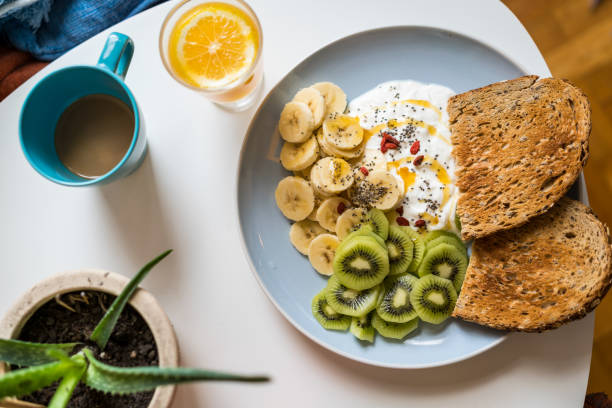
The Benefits of an Anti-Inflammatory Breakfast
1. Reduces Chronic Inflammation
An anti-inflammatory breakfast focuses on incorporating foods that help reduce the inflammatory markers in the body. For instance, omega-3 fatty acids found in foods like chia seeds, flaxseeds, and fatty fish can significantly reduce markers of inflammation. Antioxidants from fruits, vegetables, and spices like turmeric can also help combat oxidative stress and free radicals, which contribute to inflammation.
2. Provides Long-Lasting Energy
A balanced anti-inflammatory breakfast is rich in whole grains, lean proteins, healthy fats, and fiber. These nutrients provide sustained energy by regulating blood sugar levels throughout the day. Foods such as oats, quinoa, and avocados can offer slow-releasing carbohydrates and healthy fats that fuel your body for hours.
3. Supports Healthy Digestion
Many anti-inflammatory foods, such as ginger, turmeric, and fiber-rich fruits, also aid digestion. These foods support gut health, reduce bloating, and alleviate discomfort. Since inflammation often originates in the gut, consuming an anti-inflammatory breakfast can provide relief from digestive issues.
4. Enhances Mental Clarity and Focus
Chronic inflammation doesn’t just affect your body—it can also impact your mind. High levels of inflammation in the brain have been linked to mental health disorders, such as depression and anxiety. By eating an anti-inflammatory breakfast, you can help reduce brain inflammation, which may enhance mental clarity focus, and emotional stability throughout the day.
5. Promotes Long-Term Health
Incorporating anti-inflammatory foods into your breakfast is a long-term strategy for preventing chronic diseases. Studies have shown that diets high in anti-inflammatory foods are associated with a reduced risk of cardiovascular diseases, certain cancers, and neurodegenerative diseases such as Alzheimer’s
Essential Anti-Inflammatory Foods for Your Breakfast
1. Fatty Fish
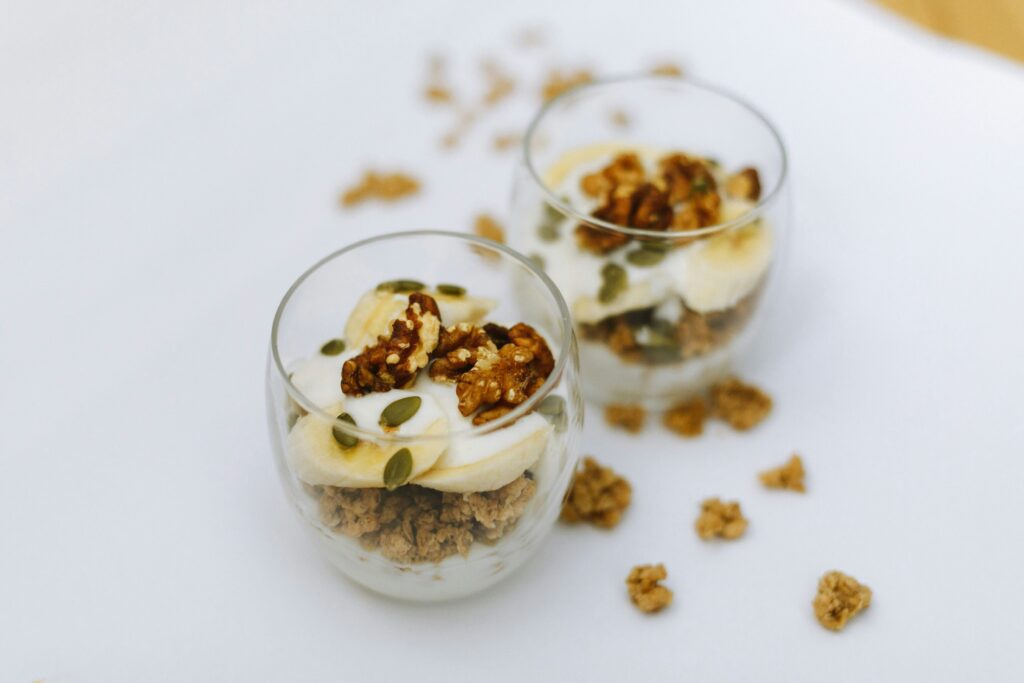
Fatty fish, such as salmon, mackerel, and sardines, are packed with omega-3 fatty acids, which are well-known for their anti-inflammatory properties. Omega-3s help reduce the production of inflammatory markers in the body and are linked to improved brain function, reduced risk of heart disease, and better joint health.
While fish might not be the first thing that comes to mind for breakfast, adding salmon to a morning salad or mixing canned sardines into an avocado toast can provide a nutrient-dense, anti-inflammatory boost.
2. Berries
Berries, including blueberries, strawberries, raspberries, and blackberries, are high in antioxidants, particularly anthocyanins, which have potent anti-inflammatory effects. Antioxidants help neutralize free radicals in the body, preventing cellular damage and lowering inflammation. A bowl of mixed berries with Greek yogurt or as a topping on your morning oatmeal is a delicious and simple way to incorporate them into your breakfast.
3. Leafy Greens
Dark, leafy greens such as spinach, kale, and collard greens are rich in vitamins, minerals, and fiber that support the body’s anti-inflammatory response. They also contain flavonoids—plant compounds that have been shown to reduce inflammation and improve cardiovascular health. A spinach and avocado smoothie or a kale salad with a poached egg can provide an anti-inflammatory breakfast full of nutrients.
4. Nuts and Seeds
Nuts and seeds, particularly almonds, walnuts, chia seeds, and flaxseeds, are great sources of healthy fats, fiber, and protein. These foods contain alpha-linolenic acid (ALA), a type of omega-3 fatty acid that has anti-inflammatory properties. Adding a sprinkle of chia seeds to your morning yogurt or a handful of walnuts to your oatmeal can provide both texture and nutrition.
5. Turmeric
Turmeric, a golden spice commonly used in Indian cuisine, contains curcumin, a powerful compound with well-documented anti-inflammatory properties. Curcumin has been shown to block inflammatory pathways and can even reduce the risk of chronic diseases. A turmeric latte or golden milk made with almond milk, turmeric, and a pinch of black pepper can make for a warming and anti-inflammatory breakfast beverage.Avocados
Avocados are not only rich in healthy fats but also contain antioxidants, fiber, and anti-inflammatory compounds like carotenoids. These nutrients help reduce oxidative stress in the body. Spread avocado on whole grain toast, add it to smoothies, or simply enjoy it with a sprinkle of sea salt for a nutritious and filling breakfast.
7. Whole Grains
Whole grains such as oats, quinoa, and farro are high in fiber and provide slow-digesting carbohydrates, which help stabilize blood sugar levels and prevent spikes that can trigger inflammation. Oats, in particular, contain beta-glucan, a type of soluble fiber that has been shown to reduce inflammation and support heart health. A warm bowl of oatmeal topped with berries and nuts is an excellent anti-inflammatory breakfast choice.
8. Ginger
Ginger is another potent anti-inflammatory food, thanks to its active compound gingerol, which helps reduce oxidative stress and inflammation in the body. Adding fresh ginger to your smoothies, oatmeal, or even tea can provide a flavorful boost to your breakfast while aiding digestion and reducing inflammation
Green Tea
Green tea is rich in epigallocatechin gallate (EGCG), a powerful antioxidant with anti-inflammatory properties. Drinking a cup of green tea with breakfast can help reduce inflammation and enhance metabolism, providing a gentle, natural energy boost.
10. Yogurt and Fermented Foods
Fermented foods like Greek yogurt, kimchi, sauerkraut, and kefir contain beneficial probiotics that support gut health. Since inflammation often starts in the gut, consuming these probiotic-rich foods can help balance your gut microbiome, reduce inflammation, and improve digestion. A parfait made with Greek yogurt, berries, and a drizzle of honey is a simple yet anti-inflammatory breakfast .
How to Build an Anti-Inflammatory Breakfast: Meal Ideas and Tips
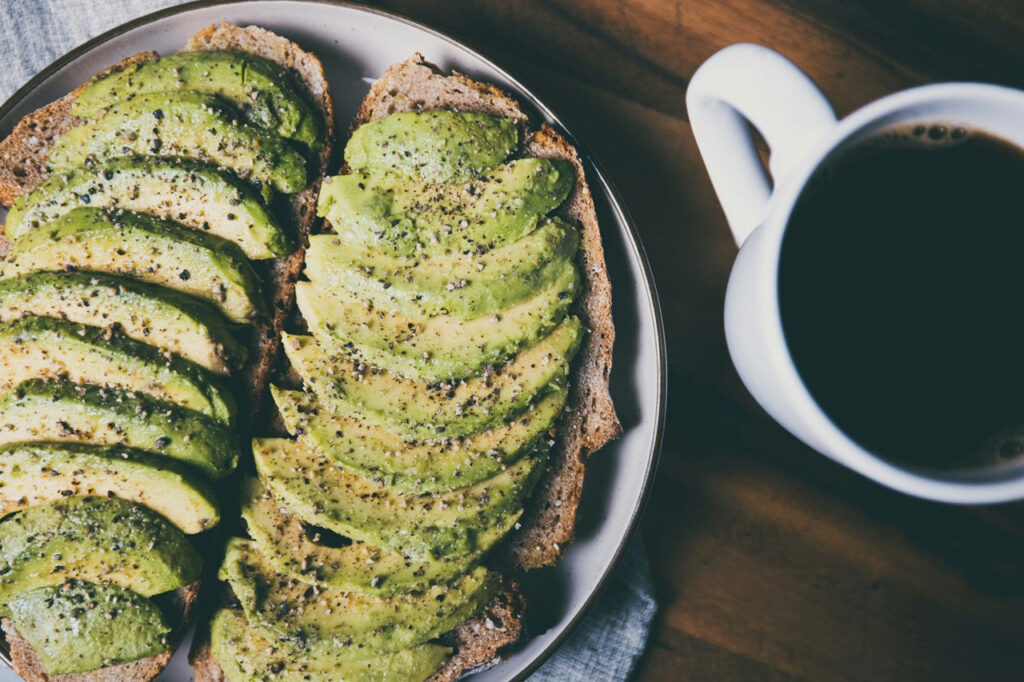
1. Anti-Inflammatory Smoothies
Smoothies are an excellent way to pack in multiple anti-inflammatory foods into one meal. Start with a base of spinach or kale, add a handful of berries, half an avocado, a tablespoon of chia seeds, and a dash of turmeric. Blend with almond milk or coconut water for a creamy, nutrient-dense breakfast that keeps you energized all morning.
2. Oatmeal with Berries and Nuts
A hearty bowl of oatmeal is a perfect anti-inflammatory breakfast. Oats are rich in fiber, which helps stabilize blood sugar levels, while berries provide antioxidants. Top your oatmeal with walnuts or almonds for added healthy fats and a satisfying crunch. Sprinkle in some cinnamon for extra flavor and anti-inflammatory benefits.
3. Avocado Toast with Eggs
Avocado toast is a popular breakfast option, but to make it even more anti-inflammatory, top your toast with a poached or scrambled egg. Eggs provide protein and healthy fats, while avocados offer heart-healthy monounsaturated fats and anti-inflammatory compounds. Add a sprinkle of chili flakes or turmeric to enhance the anti-inflammatory effects.
4. Chia Seed Pudding
Chia seeds are an excellent source of omega-3 fatty acids and fiber. Combine chia seeds with almond milk and let them soak overnight to create a delicious, creamy chia pudding. Top it with berries, nuts, and a drizzle of honey in the morning for a quick and satisfying breakfast.
5. Turmeric-Latte (Golden Milk)
If you’re looking for a comforting, warm beverage in the morning that provides anti-inflammatory benefits, a turmeric latte, also known as golden milk, is a great option. This drink is made by combining turmeric, black pepper, and non-dairy milk (such as almond, oat, or coconut milk) to create a rich, creamy beverage full of anti-inflammatory compounds.
How to make a turmeric latte:
- 1 cup almond milk (or your preferred milk)
- 1 teaspoon turmeric powder
- 1/4 teaspoon ground black pepper
- 1/2 teaspoon cinnamon
- 1/2 teaspoon honey or maple syrup (optional)
Heat the almond milk and whisk in turmeric, black pepper, cinnamon, and sweetener if using. The black pepper enhances the absorption of curcumin, the active ingredient in turmeric, making it more effective. This drink can be a soothing and anti-inflammatory start to your day.
6. Quinoa and Veggie Scramble
Quinoa is a complete protein and an excellent source of fiber,making it a great addition to an anti-inflammatory breakfast. Combine cooked quinoa with vegetables like spinach, tomatoes, and bell peppers. Add a sprinkle of turmeric and black pepper to enhance the dish’s anti-inflammatory properties. For extra protein, consider adding a couple of scrambled eggs or tofu for a fully satisfying meal.
How to make a quinoa and veggie scramble:
- 1/2 cup cooked quinoa
- 1 cup spinach (or other leafy greens)
- 1/4 cup chopped tomatoes
- 1/4 cup chopped bell peppers
- 1 tablespoon olive oil
- 1/2 teaspoon turmeric
- Salt and pepper to taste
This veggie-packed scramble provides fiber, vitamins, and antioxidants while reducing inflammation, and is a fantastic way to start your day.
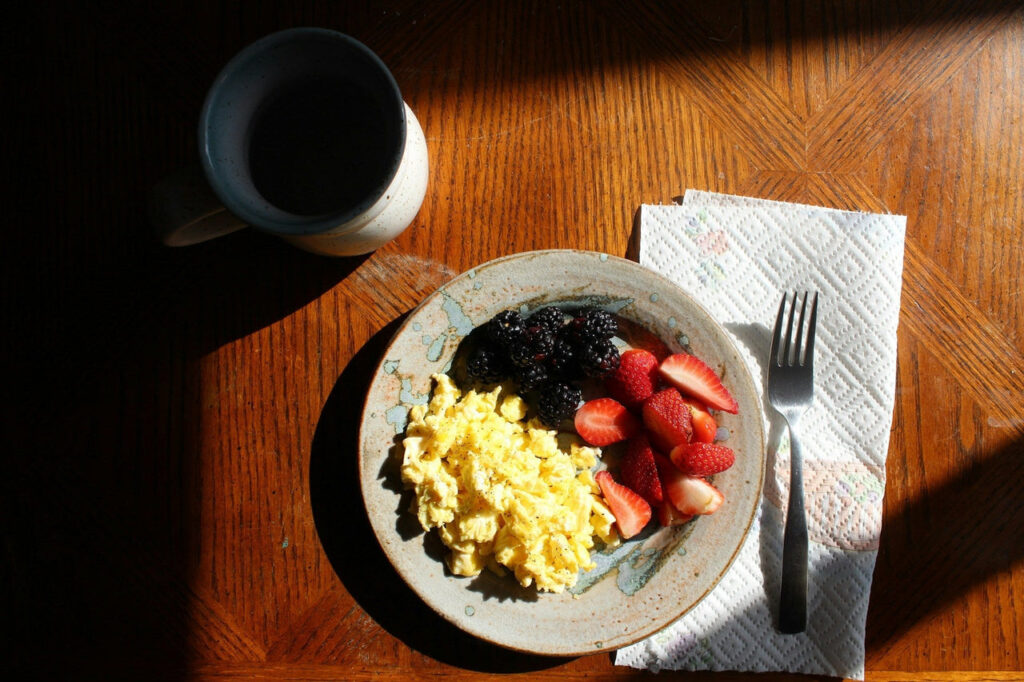
The Role of Fiber in Reducing Inflammation
Fiber plays a crucial role in reducing chronic inflammation by improving gut health. The gut is often referred to as the “second brain” due to its significant impact on overall health, and it’s where much of the body’s inflammatory responses begin. An imbalance in gut bacteria can lead to increased inflammation in the body, a condition known as gut dysbiosis.
Eating a fiber-rich breakfast can help maintain a healthy gut microbiome, which in turn can reduce systemic inflammation. Foods like oats, chia seeds, flaxseeds, berries, and whole grains are excellent sources of fiber, which help regulate digestion and support a balanced gut environment.
Fiber-Rich Breakfast Options:
- Oats with chia seeds and berries: The combination of oats and chia seeds provides soluble fiber, while berries provide antioxidants and additional fiber.
- Flaxseed smoothie: Adding flaxseeds to your morning smoothie provides soluble and insoluble fiber, which promotes healthy digestion.
- Whole grain toast with avocado: Whole grains are excellent sources of fiber and, when combined with the healthy fats in avocado, make a satiating anti-inflammatory breakfast.
By prioritizing fiber in your breakfast, you help your gut to perform its essential role in controlling inflammation, boosting immunity, and promoting digestive health.
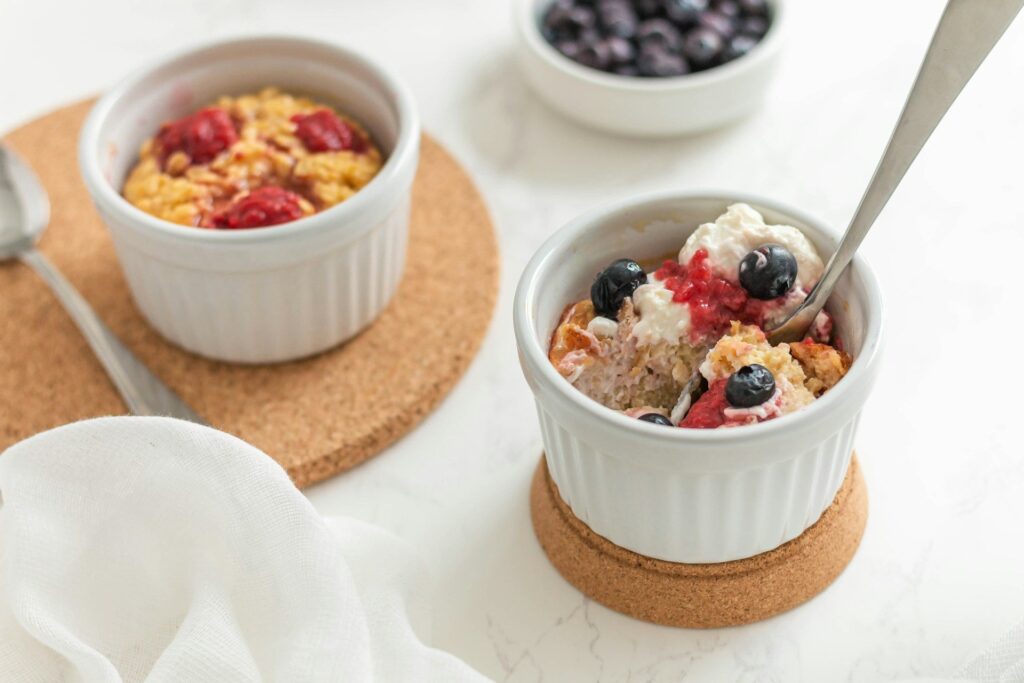
The Importance of Healthy Fats for Inflammation Reduction
Healthy fats, especially omega-3 fatty acids, play an important role in reducing inflammation. Omega-3s are found in foods like fatty fish, flaxseeds, chia seeds, walnuts, and hemp seeds. These fats can help block the production of inflammatory chemicals called prostaglandins and cytokines that contribute to chronic inflammation.
Including healthy fats in your breakfast can provide long-lasting energy while reducing inflammation throughout your body. A breakfast that combines omega-3-rich foods with antioxidant-rich vegetables and fruits can help support your heart health, reduce joint pain, and even promote better mental clarity.
Healthy Fats Breakfast Ideas:
- Chia seed pudding with a handful of walnuts and a drizzle of honey. Chia seeds and walnuts are both rich in omega-3s and provide plenty of fiber.
- Avocado toast with a sprinkle of hemp seeds or flaxseeds. Avocado provides healthy monounsaturated fats, and seeds like hemp and flax are rich in omega-3s.
- Smoked salmon and scrambled eggs: A combination of omega-3 fatty acids from the salmon and the protein from the eggs makes for a well-rounded, anti-inflammatory breakfast.
The Link Between Sugar and Inflammation
One of the key contributors to chronic inflammation in the body is a diet high in added sugars and refined carbohydrates. Studies have shown that consuming too much sugar can increase the production of pro-inflammatory cytokines, leading to an inflammatory response that can affect multiple systems in the body, including the cardiovascular and immune systems.
For breakfast, it’s important to avoid sugary cereals, pastries, and other processed foods that may be high in sugar. Instead, opt for natural sources of sweetness, such as fruit, unsweetened almond milk, or honey, which provide a healthier form of sweetness without spiking your blood sugar levels.
Sugar-Free Anti-Inflammatory Breakfasts:
- Greek yogurt with berries and a sprinkle of cinnamon: Greek yogurt is low in sugar and high in protein, while berries offer natural sweetness and antioxidants.
- Oatmeal with a touch of maple syrup: Maple syrup is a better alternative to refined sugar and can be used sparingly to sweeten oatmeal without causing blood sugar spikes.
- Avocado smoothie: Blend avocado with spinach, almond milk, and a few slices of fruit like pineapple or banana for natural sweetness.
Anti-Inflammatory Breakfast Recipes to Try

1. Turmeric Avocado Toast
Ingredients:
- 2 slices whole grain bread
- 1 ripe avocado
- 1/4 teaspoon turmeric
- 1/4 teaspoon black pepper
- 1 tablespoon olive oil
- Salt and pepper to taste
Directions:
Toast the bread. Mash the avocado and mix with turmeric, black pepper, olive oil, salt, and pepper. Spread the avocado mixture on the toasted bread. Enjoy with a sprinkle of chili flakes for extra flavor and an anti-inflammatory kick!
2. Berry and Almond Chia Pudding
Ingredients:
- 1/4 cup chia seeds
- 1 cup almond milk (or any milk of choice)
- 1 teaspoon maple syrup or honey
- 1/2 cup mixed berries (strawberries, blueberries, raspberries)
- 1 tablespoon slivered almonds
Directions:
Combine chia seeds, almond milk, and maple syrup in a jar or bowl. Stir well and refrigerate overnight. In the morning, top with fresh berries and almonds for a delicious, fiber-packed, anti-inflammatory breakfast.
3. Quinoa Breakfast Bowl
Ingredients:
- 1/2 cup cooked quinoa
- 1/4 cup almond milk
- 1 tablespoon chia seeds
- 1/4 cup berries
- 1 tablespoon almonds or walnuts
Directions:
Warm the cooked quinoa with almond milk in a pot. Stir in chia seeds and top with berries and nuts for a protein-rich, anti-inflammatory breakfast that will keep you full until lunch.

Conclusion:
Incorporating an anti-inflammatory breakfast into your daily routine is one of the simplest and most effective ways to combat chronic inflammation, boost energy, and promote long-term health. The foods discussed—such as fatty fish, berries, leafy leafy greens, nuts and seeds, turmeric, and whole grains—are not only delicious but also packed with nutrients that help reduce the body’s inflammatory markers, support digestive health, and improve mental clarity. By focusing on whole, nutrient-dense foods and minimizing refined sugars and processed ingredients, you can set a strong foundation for a day full of vitality and focus.
A well-rounded, anti-inflammatory breakfast can also have lasting effects on your overall health, reducing the risk of chronic diseases like heart disease, diabetes, and arthritis. Additionally, by prioritizing foods rich in fiber, healthy fats, and antioxidants, you support the gut, brain, and immune system, ensuring that your body can function at its best.
The versatility of anti-inflammatory breakfasts means you can easily tailor your meals to suit your preferences and dietary needs. Whether it’s a hearty quinoa bowl, a vibrant smoothie, or a nourishing avocado toast, the possibilities are endless. It’s all about making informed choices and ensuring that you’re fueling your body with the right ingredients to reduce inflammation and sustain energy throughout the day.
As you start your day with an anti-inflammatory breakfast, remember that every positive change in your diet, no matter how small, can have a profound impact on your long-term health. By making these conscious food choices, you are not only preventing inflammation but also giving yourself the gift of lasting well-being
Q&A Section:
Q: What are some key foods to include in an anti-inflammatory breakfast?
A: Key foods include fatty fish (like salmon), berries, leafy greens, avocados, whole grains, nuts and seeds, turmeric, and ginger. These foods contain antioxidants, omega-3s, and healthy fats that help reduce inflammation.
Q: How does an anti-inflammatory breakfast help reduce chronic inflammation?
A: Anti-inflammatory foods contain compounds that lower the production of inflammatory markers in the body. These foods, such as antioxidants and omega-3 fatty acids, help to prevent and reduce inflammation.
Q: Can an anti-inflammatory breakfast boost energy levels?
A: Yes, foods like whole grains, healthy fats, and fiber provide sustained energy by regulating blood sugar levels, helping you avoid energy crashes throughout the day.
Q: Are anti-inflammatory breakfasts only for people with chronic inflammation?
A: No, anti-inflammatory breakfasts benefit everyone by promoting overall health, boosting the immune system, supporting digestion, and enhancing brain function, even for those without chronic inflammation.
Q: Can I have an anti-inflammatory breakfast if I’m on a gluten-free diet?
A: Yes! Many anti-inflammatory foods, such as quinoa, almonds, chia seeds, and leafy greens, are naturally gluten-free and can easily be included in your breakfast.
Q: How long will it take to feel the effects of an anti-inflammatory breakfast?
A: The benefits of an anti-inflammatory diet build over time. While you may experience increased energy within a few hours, long-term inflammation reduction and health benefits can take weeks or months of consistent dietary changes.
Q: Is turmeric effective for inflammation, and how can I include it in my breakfast?
A: Yes, turmeric contains curcumin, a potent anti-inflammatory compound. You can add turmeric to your breakfast by making a turmeric latte, adding it to smoothies, or sprinkling it on avocado toast.
Q: Can I combine anti-inflammatory foods with a high-protein breakfast?
A: Absolutely! Protein is an essential part of a balanced meal. Foods like eggs, Greek yogurt, and tofu can be paired with anti-inflammatory ingredients like berries, leafy greens, and avocados for a nutrient-rich breakfast.
Q: Can anti-inflammatory breakfasts help with weight management?
: Yes, anti-inflammatory foods that are high in fiber, healthy fats, and protein help control appetite, stabilize blood sugar, and promote satiety, which can support weight management over time.
Q: Are there any anti-inflammatory foods that I should avoid in my breakfast?
A: It’s best to avoid refined sugars, processed foods, and artificial additives, as they can trigger inflammation in the body. Focus on whole, natural ingredients for an anti-inflammatory breakfast.
Research suggests that the biological link between diet and mental health may be related to the following:
.